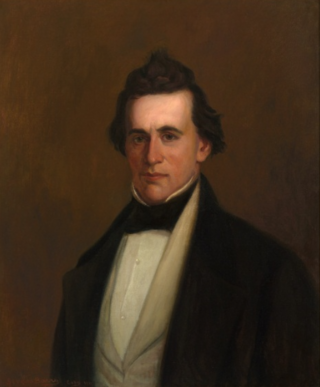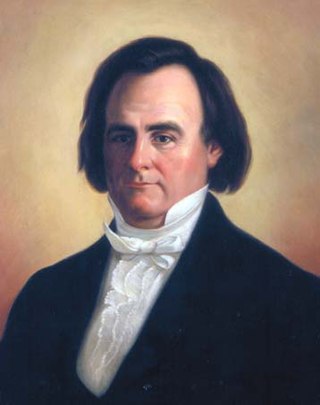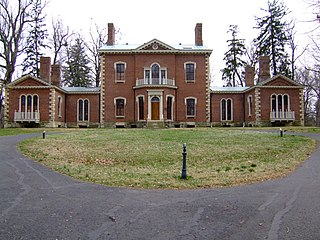Related Research Articles

The 1824 United States presidential election was the tenth quadrennial presidential election. It was held from Tuesday, October 26 to Thursday, December 2, 1824. Andrew Jackson, John Quincy Adams, Henry Clay and William Crawford were the primary contenders for the presidency. The result of the election was inconclusive, as no candidate won a majority of the electoral vote. In the election for vice president, John C. Calhoun was elected with a comfortable majority of the vote. Because none of the candidates for president garnered an electoral vote majority, the U.S. House of Representatives, under the provisions of the Twelfth Amendment, held a contingent election. On February 9, 1825, the House voted to elect John Quincy Adams as president, ultimately giving the election to him.

Henry Clay Sr. was an American lawyer and statesman who represented Kentucky in both the U.S. Senate and House of Representatives. He was the seventh House speaker as well as the ninth secretary of state. He unsuccessfully ran for president in the 1824, 1832, and 1844 elections. He helped found both the National Republican Party and the Whig Party. For his role in defusing sectional crises, he earned the appellation of the "Great Compromiser" and was part of the "Great Triumvirate" of Congressmen, alongside fellow Whig Daniel Webster and Democrat John C. Calhoun. Clay died at the age of 75 in 1852.

Clay County is a county in the U.S. state of Tennessee. As of the 2020 census, the population was 7,581. Its county seat and only incorporated city is Celina. Clay County is named in honor of American statesman Henry Clay, member of the United States Senate from Kentucky and United States Secretary of State in the 19th century.

Owsley County is a county located in the Eastern Coalfield region of the U.S. state of Kentucky. As of the 2020 census, the population was 4,051, making it the second-least populous county in Kentucky. The county seat is Booneville. The county was organized on January 23, 1843, from Clay, Estill, and Breathitt counties and named for William Owsley (1782–1862), the judge of the Kentucky Court of Appeals and Governor of Kentucky (1844–48). According to the 2010 census reports, Owsley County has the second-highest level of child poverty of any county in the United States. In terms of income per household, the county is the poorest in the nation. Between 1980 and 2014, the rate of death from cancer in the county increased by 45.6 percent, the largest such increase of any county in the United States.

Manchester is a home rule-class city in Clay County, Kentucky, in the United States. It is the seat of its county and the home of a minimum- and medium-security federal prison. The city's population was 1,255 at the 2010 census.

John Jordan Crittenden was an American statesman and politician from the U.S. state of Kentucky. He represented the state in the U.S. House of Representatives and the U.S. Senate and twice served as United States Attorney General in the administrations of William Henry Harrison, John Tyler, and Millard Fillmore. He was also the 17th governor of Kentucky and served in the state legislature. Although frequently mentioned as a potential candidate for the U.S. presidency, he never consented to run for the office.

John D. White was an American lawyer and politician who was the 15th speaker of the United States House of Representatives from 1841 to 1843. A member of the Whig Party, he represented Kentucky in the United States House of Representatives from 1835 to 1845. He was also a member of the Kentucky House of Representatives in 1832.

Charles Anderson Wickliffe was a U.S. Representative from Kentucky. He also served as Speaker of the Kentucky House of Representatives, the 14th Governor of Kentucky, and was appointed Postmaster General by President John Tyler. Though he consistently identified with the Whig Party, he was politically independent, and often had differences of opinion with Whig founder and fellow Kentuckian Henry Clay.
Operation Boptrot, also referred to as Boptrot, was an investigation by the United States Federal Bureau of Investigation (FBI) into corruption among the Kentucky General Assembly, the Commonwealth's legislature. The operation was highly successful, with the investigation culminating in several indictments in 1992, leading to the conviction of more than a dozen legislators between 1992 and 1995. The investigation also led to reform legislation being passed in 1993.

A crupper is a piece of tack used on horses and other equids to keep a saddle, harness or other equipment from sliding forward.

Major General Cassius Marcellus Clay was an American planter, politician, military officer and abolitionist who served as the United States ambassador to Russia from 1863 to 1869. Born in Kentucky to a wealthy planter family, Clay entered politics during the 1830s and grew to support the abolitionist cause in the U.S., drawing ire from fellow Southerners. A founding member of the Republican Party in Kentucky, he was appointed by President Abraham Lincoln as the U.S. minister to Russia. Clay is credited with influencing Russian support for the Union during the American Civil War.

Ashland is the name of the plantation of the 19th-century Kentucky statesman Henry Clay, located in Lexington, Kentucky, in the central Bluegrass region of the state. The buildings were built by slaves who also grew and harvested hemp, farmed livestock, and cooked and cleaned for the Clays.

Green Clay Smith was a United States soldier and politician. Elected to the Kentucky state house before the American Civil War, he was commissioned as a Union officer when he volunteered, advancing to the rank of brigadier general before he resigned to go to Congress. He was promoted to major general by brevet on March 13, 1865. He was elected to the US Congress from Kentucky in 1862, representing the Unconditional Union Party and serving until 1866.

James Brown Clay was an American politician and diplomat who served as a member of the United States House of Representatives for Kentucky's 8th congressional district from 1857 to 1859.

Laura Clay, co-founder and first president of the Kentucky Equal Rights Association, was a leader of the American women's suffrage movement. She was one of the most important suffragists in the South, favoring the states' rights approach to suffrage. A powerful orator, she was active in the Democratic Party and had important leadership roles in local, state and national politics. In 1920 at the Democratic National Convention, she was one of two women, alongside Cora Wilson Stewart, to be the first women to have their names placed into nomination for the presidency at the convention of a major political party.

Joe Elsby Martin Sr., was an American boxing coach who trained two world heavyweight champions, Muhammad Ali and Jimmy Ellis, as well as several national Golden Gloves champions.

White Hall State Historic Site is a 14-acre (5.7 ha) park in Richmond, Kentucky, southeast of Lexington. White Hall was home to two legendary Kentucky statesmen: General Green Clay and his son General Cassius Marcellus Clay, as well as suffragists Mary Barr Clay and Laura Clay. On April 12, 2011, White Hall was designated as a national historic site in journalism by the Society of Professional Journalists, because of Clay's career as a publisher.

Brutus Junius Clay was a U.S. Representative from Kentucky, and a son of Green Clay. His brother Cassius Marcellus Clay also was a politician in the state, and they both joined the Unionist Party at the time of the American Civil War.
Nathaniel Gray Smith Hart was a Lexington, Kentucky lawyer and businessman, who served with the state's volunteer militia during the War of 1812. As Captain of the Lexington Light Infantry from Kentucky, Hart and many of his men were killed in the River Raisin Massacre of January 23, 1813, after being taken prisoner the day before following the Battle of Frenchtown in Michigan Territory.
Royce William Adams was an American politician from Kentucky who was a member of the Kentucky House of Representatives from 1992 to 2013. Adams was first elected in a September 1992 special election following the resignation of incumbent Clay Crupper. He did not seek reelection in 2012 and was succeeded by Republican Brian Linder.
References
- ↑ "Interview with Clay Crupper, July 12th, 2006". www.kentuckyoralhistory.org. Archived from the original on January 23, 2015. Retrieved May 20, 2015.